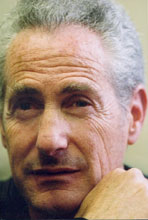Barry Gifford is most recently the author of Sailor & Lula: The Complete Novels.

Listen: Play in new window | Download (Running Time: 38:39 — 35.4MB)
Condition of Mr. Segundo: Wilder than his heartburn.
Author: Barry Gifford
Subjects Discussed: [List forthcoming]
EXCERPT FROM SHOW:
Gifford: Well, the point is “Don’t be a victim.” I mean, I think I have another chapter somewhere that’s called “Victims.” But that’s always been another kind of thing that I could never abide. People who see themselves as victims. You know, with a capital V. And I just don’t like to be around people like this. People who complain all the time or are a victim or who feel that they’re a victim of their environment, their parents, their husband, their wife, their boyfriend, their girlfriend, God. Whatever it is that they want to call it. It’s convenient, isn’t it? It’s an easy way out. And in the case of the kids in Perdita Durango, they’re just kids. They were like dumb college kids. And here they were kidnapped for the purpose of human sacrifice. I mean, what a terrible thing? And Romeo and Perdita are certainly colorful characters, but malevolent ones. So they’re the natural contrast to Sailor and Lula.
Correspondent: But these two college kids. Did you really feel a good deal of fury or hatred towards them?
Gifford: No! No, I don’t feel any fury or hatred towards any of these characters. I mean, in one sense, yes, we’re all subject to all of the things that have come before, to our upbringing, and to all these things that I mentioned. The key is: How do you deal with them? How do you assert yourself? How do you retain some semblance of control over your own life? Control has always been a big issue with me. I’m not an easily controlled person. In a way, I’m very faithful and loyal and all those things. But it has to be on my own terms. In the sense that if somebody is there purposefully and clearly and obviously attempting to manipulate me, that’s over. There’s no chance of my having any sort of friendship or relationship with that person. And that’s what Perdita Durango is mainly about. Now nobody had a worse childhood than Perdita Durango. She’s definitely — if anybody could be called a victimized person. It laid out her life for her. And what does she try to do? She’s trying to control her own existence. She’s fighting for her life. And that’s the theme that I always felt with Perdita. I love Perdita. I mean, she’s crazy and she’s dangerous. But I love her.
Correspondent: These issues of control are interesting. Because here you have worked in Hollywood, in which the writer is always considered last. For the most part. I know that you appeared on a panel recently in which you had no problem with your books being adapted and being transformed into something different. But there is, in dealing with Hollywood, a sense of capitulating control. And I’m curious as to how you find control in a situation in which you know the writer’s always going to get screwed.
Gifford: Well, as my friend Richard Price has mentioned before, and said the other night, he says, “I’m in it only for the money. I have my books.” And one thing that I said was, after the film Wild at Heart came out, people said to me, “Well, what do you think about what David Lynch did to your book?” I said, “I wasn’t aware that he did anything to my book.” I knew what they were asking. But the book is still there. Read the book. He didn’t change a sentence. He didn’t change a period or a comma. The book is there. The movie may endure the book. It may or may not endure whatever it happens to be. But it’s still there. It’s inviolable. The movie’s another animal. It’s a different form. It’s a different art form. You have other opportunities with movies. And I love the movies. And I learned a lot about how to write from the movies when I was a child. Just watching all-night movies all the time. That sort of thing. And I learned how to tell a story, and how to build character development, and all that kind of thing. That doesn’t mean that I sat down to write movies. I did not. And when I have the opportunity, or choose the opportunity, to write a screenplay, really the writer only has one shot at it. It’s that first draft. So when you write that first draft, you have to see that movie the way you want it to be seen. And so there are no excuses. Of course, there’s more or less manipulation. I mean, sometimes I work better in Europe. Because they change fewer things. But it isn’t the case with Lost Highway, which David Lynch and I wrote together. Everything that’s in that movie is written. It’s all there Nothing was changed. So what could be better than that?
(Image: Robert Birnbaum)
Listen: Play in new window | Download (Running Time: 38:39 — 35.4MB)
3 Comments